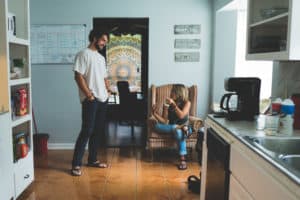
Public emergencies, like the coronavirus pandemic (COVID-19) that we’re currently in, test everyone’s ability to remain calm in the face of uncertainty. It’s having an unprecedented impact on seemingly every aspect of day-to-day life, and SAFE Project knows that it’s affecting communities across the country in different ways. One group that it literally hits close to home is the recovery housing community.
Recovery houses are safe, healthy, family-like substance-free living environments that support individuals in recovery from addiction. After treatment, individuals transitioning out of rehab may feel more secure if they live in an atmosphere that fully supports their recovery. Recovery homes are family-like communities of support. They’re an opportunity for individuals in recovery to reintegrate into society through a safe and supportive environment.
People in the recovery housing community are familiar with persevering through adversity while keeping the end-game in sight. However, recovery houses are often small and locally run. They also rely heavily on harnessing the power of community, and in this current climate, the concept of community is being reimagined and is continually evolving. Even though the recovery housing “community” may look different than it did a month ago, it’s nevertheless as important, if not more so, than before.
SAFE Project’s Recovery Housing program supports the recovery housing community, which includes collegiate, veterans and general recovery houses. We’ve put together some tips and recommendations below that we hope will help alleviate some of your concerns about living in recovery housing at this time, while helping communities plan for the future. Emergency preparedness can save lives and is everyone’s responsibility.
Recovery Housing Residents
Communicate concerns – If you’re concerned about your physical well-being, mental health or finances, speak to the owner/operator of your recovery house. Quickly addressing these concerns can alleviate some anxiety. Don’t be afraid to ask for help! Self-advocacy is key.
Be accountable – Accountability is vital for YOU and YOUR community during these times. Examples of accountability include completing daily chores, contacting your healthcare providers, networking with your recovery community, completing schoolwork and keeping up personal hygiene.
Stay connected – Virtual meetings are available for any recovery path and spiritual growth. This is a great time to get to know your housemates and to continue to grow your recovery network across the country.
Check-in with local nonprofits – If you’re available and able, check in with your local nonprofits, 12-step central offices, religious affiliates and next-door neighbors. This is a great time to lend a helping hand – and many nonprofits can use your skills virtually. You can join SAFE Project’s Volunteer Program or simply connect with organizations in your area.
Recovery House Owners and Operators
Take care of yourself – Owning or operating a recovery home is a labor of love and service, but it’s essential that you take care of yourself. The residents you serve depend on it!
Be transparent and communicate with your residents – This is a challenging time, and you’ll be confronted with questions that you might not know the answer to. Stick to your normal routine with residents. Follow up with the residences’ basic needs and requirements and keep an open line of communication.
Screen incoming residents – Be prepared to screen potential residents for travel and COVID-19 symptoms. Asking them if they have difficulty breathing, a cough or fever is essential to
keep your recovery residence safe and healthy.
Stay connected – Social distancing amplifies the need to connect virtually. Reach out to other owners and operators through social media. Having your own network is useful during these times. This Recovery Housing Facebook group connects resources and provides a forum for discussion regarding recovery housing on a local, state and national level. If you’re an owner/operator, a person seeking recovery housing, a professional that works with recovery support systems or have an interest in recovery housing, join today! You can also explore many other recovery housing/sober living social network groups.
Prepare for the future – During a crisis is not the time to create an emergency plan. Create, implement or assess the following procedures for your recovery house so you are prepared for the future.
- Healthcare provider plan
- Medication plan
- Financial plan
- Recovery plan
- Emergency plan
General Public
Offer resources – Recovery homes are struggling to stay open in this unstable economic environment. Offer your resources, knowledge or expertise. Check-in with your local recovery house to see if they need anything.
We encourage you to look for guidance from the National Association of Recovery Residences (NARR) and Oxford House. Follow the Centers for Disease Control and Prevention (CDC) and the World Health Organization (WHO) for more ways to navigate COVID-19.
If you’d like to know more about recovery housing and how we are supporting the recovery housing community, contact us at community@safeproject.us. SAFE Project is here for you, and together, we’ll move forward as a community.
